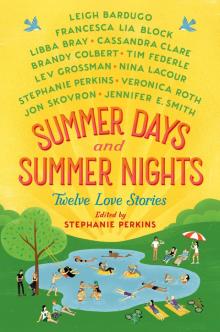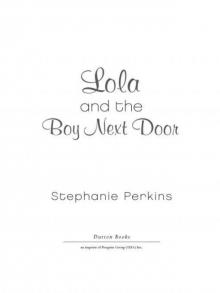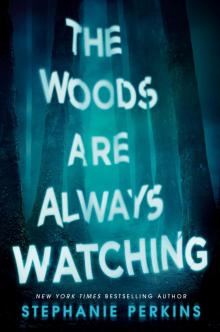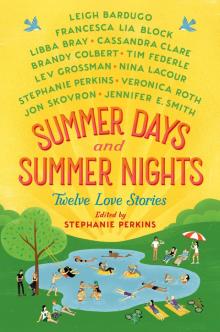- Home
- Stephanie Perkins
Summer Days and Summer Nights: Twelve Love Stories Page 5
Summer Days and Summer Nights: Twelve Love Stories Read online
Page 5
I turn back to the book, but I can’t even see what I’m looking at anymore. I sit very still until I hear the door close. Mom’s footsteps fade down the hallway. I turn to a new page in my notebook and pick up the protractor, but I press too hard on the curve and the lead breaks.
I set my homework aside and open my laptop. I search for Turkish textiles and start a new Pinterest board. I collect patterns and colors, pictures of Turkish tiles for inspiration. I learn about the different traditional motifs—animals and flowers and trees—until I get very tired and give in to the comfort of my bed.
* * *
In the midst of a lecture on the Pythagorean theorem, Mr. Trout sees something out the window. His whole face transforms; a smile takes over. I turn to find out what he’s seeing. It’s a woman, carrying a picnic basket.
“Flora,” he says. “Do me a favor and finish this proof, will you? And then move on to the next one.” On his way out the door, he turns. “And then the one after that.”
So I go up to the whiteboard and take the marker. I turn back around to see Mr. Trout embracing the woman. When they let go, she takes a picnic blanket from where it was tucked under her arm and spreads it out, right there on the grass outside the classroom.
I finish Mr. Trout’s drawing and explain what I’m doing, and then I turn back. Everyone is watching as the woman removes two sandwiches from the picnic basket, both wrapped in parchment paper and tied up in bows. Next comes a dish of strawberries and two champagne flutes. She reveals a bottle of sparkling water with a flourish, says something, and they both laugh, their heads thrown back.
I feel awkward standing here, not doing anything, so I check his notes for what I’m supposed to be working on next, erase the drawing I just did, and start the next one.
“Okay, so this is the algebraic proof,” I say. “A squared plus b squared equals c squared.”
I draw the big square with a smaller square tilted inside of it and label all the parts. I don’t even turn around, because I know no one is paying any attention. When I’m finished, I set down the marker and look out the window. Mr. Trout and the woman are relaxed on the blanket, eating and talking as though they are in the middle of a park on a Saturday afternoon. Everyone in the room is turned toward the window, taking in the sight.
Everyone except Mimi, who is looking at me.
All at once, it comes back: the first time I saw her, when I was waiting for Blake by the oak tree, and she was passing out flyers for the Gay-Straight Alliance. “Do you go here?” she asked. I shook my head no. “I didn’t think so,” she said. “Too bad.” And then she handed me a flyer anyway.
A couple weeks later, under that same tree, my heart beating hard at the sight of her. “How’s the club going?” I asked.
She shrugged. “It isn’t, really. Too much Straight, too little Gay, which kind of defeats the purpose.”
Travis and Hope were there, beside her.
“Don’t blame us,” Travis said. “We’re just being supportive.”
“I don’t think I’m really a club person anyway,” Mimi said.
Now, almost three years later, with our teacher picnicking outside and the rest of the class engrossed in it, she raises her hand.
“Yes?” I say.
“Why are you taking this class?”
And maybe it’s because of the bizarreness of the moment. Or because, in the midst of the twenty other students facing away from us, it feels like Mimi and I are alone in this classroom. Whatever the reason, I decide to answer honestly.
“I needed to get out of the house.”
* * *
“We’re going camping,” Mimi says, two hours later. “Want to come?”
We’re in the spot where Mr. Trout and his lady friend had their picnic, but the evidence has been cleared away. He came back into the room as though nothing had happened and told us all to head to lunch.
“When?” I ask her.
“Tomorrow morning, just up to Muir Beach for a couple of nights.”
“I don’t think I can,” I say. “I want to, but I have plans.”
“Fourth of July party?”
“Not quite. It’s, like, a decorating thing. With my mom.”
“That’s too bad, because we could all use some help with geometry.”
“Oh,” I say. “You’re just in the market for some free tutoring?”
“Not just,” Mimi says.
“Break’s over!” Mr. Trout calls from the classroom. “I shouldn’t have to be telling you this! You all have cell phones with the time!”
“Pretty bold for someone who just had a picnic during their workday,” Travis calls back.
“That’s fair,” Mr. Trout says. “But I’m still in charge.”
I pivot and head back to the classroom.
At the end of the day, on her way out of class, Mimi hands me a note. Across the span of our history, it’s the second piece of paper she’s given me. This one is bigger than the GSA flyer, on graph paper, folded into a little square. In case your plans fall through, it says. Then, under it, a drawing of a tent, a couple trees, the moon and stars, and a fire. Beneath, she’s written, Muir Beach, site 12.
* * *
“Lattes first,” Mom says. “Then the curtain shop!”
She wants to drive separately because she has more errands to run afterward. While she’s ordering at our usual café, I choose a table and open up my laptop to show her the board I’ve created.
“This is so fun,” she says when she sits. “Look at this one! I love that color.”
“I do, too,” I say, and scroll down so she can see more like it. “I was thinking maybe it isn’t crazy to get the curtains first, before we know what the space is like. It could help us commit to the decorating scheme.”
“You’re so smart. I think the barista just called our names,” Mom says. “Let’s go.”
We drive to the textile store and finish our lattes outside. I can see from the front window that there will be lots of choices, and I tell myself that the excited feeling is good, not a betrayal of myself. Feelings can be complicated, Jessica always tells me. They can contradict each other. They don’t need to make sense.
I peer into the window and catch sight of a pattern featured on a wall.
“I think I see one,” I tell her.
“Where?” she asks.
“Next to that window, the third one in.”
Mom’s face, next to mine at the window, the feeling of showing her something … It sparks something forgotten in me, from before the end of love appeared and began repeating itself, even in my sleep. We throw our cups away and step into the shop.
“Hi there!” the woman behind the counter says. “I have your order in the back.”
“What order?” I say.
Mom shrugs like it’s cute. “You caught me! I couldn’t resist taking a quick look. I popped in a couple days ago and fell head over heels for a print.”
“Why am I here then?”
“We’ll need more than one set of drapes. Now, show me the ones you were looking at.”
I lead her to the wall I spotted through the window, but up close they aren’t what I thought they would be.
“Great colors,” she says. “Come see what I chose—you’re going to love them.”
The saleswoman lays a panel on the counter for my mom to inspect. They’re blue and white Ikat, not Turkish at all, not the warm colors we’ve been looking at.
“Isn’t it beautiful? Maybe with a rustic coffee table and leather sofas…” Her eyebrows are raised, she’s smiling in expectancy.
“Sounds nice,” I muster.
“Okay,” she says. “I have a surprise for you. One more stop. Follow me!”
* * *
I follow her onto the freeway and through the tunnel, into our cluster of tiny suburban towns. She turns onto a residential street and I turn after her. We park in front of a new condo complex. She’s holding a key in one hand and the bag with the curtains over her arm
.
“What’s happening?” I say.
“Come and see,” she singsongs. And then she leads me up some concrete steps to a red door. She turns the key, and there’s an empty living room. “Surprise! Welcome home, Flora.”
The beehive is back, all buzzing and beating wings inside me. My vision blurs with it. “Are you fucking kidding me?”
Confusion flashes across her face.
“You don’t like it?”
“Surprise, welcome home? Help me choose curtains?”
“Flora…”
But I’ve already turned away. I’m already back down the stairs, and inside my car, and I don’t even look at her as I drive away. I don’t know where I’m going, and soon I have to pull over because I’m crying too hard.
I thought when you got divorced you were supposed to fight over all the stuff. The house and the cars and the furniture. The wedding gifts that are still around. The art collection, if you’re the type of people who collect art, which my parents happen to be. I thought you were supposed to want to hold on to the pieces of your life. I thought the years that came before were still supposed to matter.
I want the love seat. I want the daisy mugs. I want the eggcups. I want the welcome mat, and the portrait of Granny, and the rocking horse, and the wallpaper off the walls. I want the piano and the Navajo rug. I want my room and I want my dad and I want, I want, I want.
* * *
“So you do like us!” Travis says when I get out of my car and step from gravel to grass.
“Of course I like you.”
“You don’t sit with us in class,” Hope says. “It hurts our feelings.”
All three of them are perched on folding chairs in different bright colors. Mimi is resting her bright-red sandaled feet on a tree stump. She’s twisting the loose strap of her cutoff overalls and smiling at me. I blush, and it’s like I’m a freshman again. But we’re both older now and more able to say what we want.
“I was hoping you’d show up,” she says.
I open my mouth to say something flirtatious and light, but instead a cry comes out. Tears fall. I didn’t see this coming. I put my hands over my face.
“Oh my God,” I say. “This is so embarrassing.” But thankfully I’m laughing now, and the crying has stopped.
“Are you okay?” Hope asks.
“It’s just been a rough … day? Month? Last couple of years?”
“We’ve been wondering what’s wrong. You sit in the front, and you never talk to anyone unless we, like, force you to talk to us.”
“You space out a lot,” Travis says.
“You look sad,” Mimi says. “I remember you smiling a lot more.”
“My parents are getting divorced,” I say. I never really speak the words, unless I’m talking to Jessica. Divorce is so common, such a privileged problem to have when some people are faced with truly horrible things. But once I say it, I say it all. “They’ve been on and off for two years. Trial separations. For a long time, they seemed to truly hate each other—like viciously—but now it’s permanent, and the hate is gone. They’re fucking cheerful. My dad has started whistling.”
“So you signed up for geometry, even though you could teach the class,” Mimi says. “And what happened with your decorating plans?”
I shake my head. “Disaster.”
“Well,” Travis says, “if you have to run away, at least you are now finding yourself in paradise.”
It’s true. We’re in the woods, but I can smell the ocean. Redwood trees tower above us; a flock of blue birds takes to the air from a branch near us. I watch them move through the sky, dipping and spreading apart and coming back together, until they are out of sight. I turn back to the camp and take all of it in. There are two tents pitched, a neat row of backpacks lined up between them. Their chairs circle a fire pit, and next to it is a giant cooler covered in California state park stickers.
They are clearly pros at this.
“You guys,” I say. “I am so unprepared. I stopped at Walgreens on the way, but all I got was a toothbrush.”
“My tent sleeps two,” Hope says.
“I have an extra blanket,” Mimi says.
Travis gestures to the old Volvo parked in front. “In my car I have enough hoodies to clothe a small village.”
It feels so good to laugh.
“So what compelled you to come camping with the misfits?” Travis asks.
“What makes you misfits?”
“Well, to begin,” Mimi says, “we’re all terrible at math.”
“And we’re all mixed,” Travis says. “Mimi’s half Korean American and half white, I’m half Mexican and half white, and Hope? Well, Hope’s got it rougher than anyone.”
Hope nods in mock solemnity and says, “Half French, half Dutch.”
“Besides all that,” Mimi says, “we’re, like, the only group of friends in the history of high school that has never had a fight, never fallen in love with each other, and never made out with another one’s significant other.”
“We feel more at home at campsites than we do in our houses,” Hope says.
“We’ve encountered four bears over the last three years and we have never been eaten.”
“And,” Mimi concludes, “we have never—not once—attended a high school dance.”
“Why not?” I ask.
“We camp instead,” Hope says. “It was established homecoming of freshman year. Our parents wouldn’t let us camp alone, though, so Travis’s parents set up their tent a few sites away and came to check on us every few hours.”
“That’s sweet,” I say.
Mimi says, “Once, sophomore year, we camped in Hope’s backyard.”
“Desperation,” Hope says. “None of our parents were willing to camp in December.”
“Do you like fish?” Travis asks. “We got a trout in our teacher’s honor.”
“Seriously?”
“Well, we always grill a trout, but this time it has special significance.”
“Bad news on the booze front,” Hope says, unzipping one of the backpacks. “I was only able to get my hands on the dregs of a bottle.”
Travis examines the label. “Bourbon.”
“I prefer tea when camping anyway,” Mimi says, holding up her mug.
“Did you bring tea?” Travis asks.
“There’s mint growing everywhere around here,” Mimi says.
“So you just picked it and dropped it into your cup?”
“Yeah.”
“Gross.”
“I have no idea what you are even talking about,” Mimi says. “I do this every time. And how is mint tea gross?”
“But is it really tea,” Travis says. “Because my understanding is that tea is dried stuff.”
Mimi shakes her head, opens her eyes wide, and stares into her mug.
“We can’t even look it up,” Hope says.
“It’s possible we’ll never know,” Travis says.
“I want to try it,” I say. “The tea.”
Mimi looks at me. “So you’re with me on this one?”
I smile at her and shrug. “I guess I need to taste it to find out.”
She stands. Sets her mug down where she was sitting. She has all these little marks on her thighs from the texture of the rock she was sitting on. She walks along the path to the patch of mint, and I watch her break off a stem.
She pours water from the bottle into the tin pot and sets it over the flame.
“Did you bring a mug?” she asks me.
I shake my head.
She steps into her tent and emerges a few seconds later with a green mug, and I can’t help thinking about how her mouth has probably been pressed to it so many times, and soon mine will be, too. She drops in the mint that she picked for me. She pours the hot water and places the mug into my hands.
“Let it steep for a few minutes,” she says.
* * *
“I was thinking,” Hope says after dinner. “About your tattoo. If you g
et it, you should also get one on your other arm, and that one should say the beginning of love. That way, depending on whether you choose to read them left to right or right to left, it could be that love began and now it’s ending, or that love ended and is now beginning again.”
The fire they built is going strong, lighting up their faces.
“But I thought love was supposed to be eternal,” I say.
Travis sighs. “Just another lie they feed us when we’re children. At least they’re happy about it, though.”
“They’re not happy,” I say. “They’ve just obliterated themselves.”
There was a night last January, a night that Mom and I pretend never happened. The holidays had been full of stress and traffic and travel. The whole ride up to Portland, where we always spent Christmas, my heart had raced with the anticipation of coming out to my cousins and aunt and uncle and grandmother. Someone was bound to ask me if I had a boyfriend—they did every year—and I didn’t want to just say no. I was so swept up in it that I barely noticed that my parents were more hostile than usual, until the drive home, when my mind was clearer. They stayed together for most of January, but the house may as well have been a trap—one misstep and blades would plummet from the ceiling, or the living room would fill with poisonous gas.
By the end of the month, Dad was staying with his friend a few towns away. One night I was up late with homework, trying to concentrate, and I thought a snack might help me through it.
My mother was down there, alone at the kitchen table.
“It didn’t make things easier on us,” she said out of nowhere, “that you had to tell the family when you did. I’m not saying you caused it, but there was tension between us before that, and to have that added stress … And at Christmas.”
I tell them about it.
Mimi says, “And I hope you said, ‘That’s fucked up, Mom.’”
“No,” I say. “I didn’t say that.”
“Well, I hope you do.” She sips her tea. I sip mine. “I hope you tell her in the near future.”
“The nearest future,” Hope says.
“Like, tomorrow night,” Travis says. “Like, the first thing you say when you walk through the door.”
“Wait,” Hope says. “What about now?”

 Summer Days and Summer Nights: Twelve Love Stories
Summer Days and Summer Nights: Twelve Love Stories Anna and the French Kiss
Anna and the French Kiss Lola and the Boy Next Door
Lola and the Boy Next Door There's Someone Inside Your House
There's Someone Inside Your House Isla and the Happily Ever After
Isla and the Happily Ever After The Woods Are Always Watching
The Woods Are Always Watching Summer Days and Summer Nights
Summer Days and Summer Nights